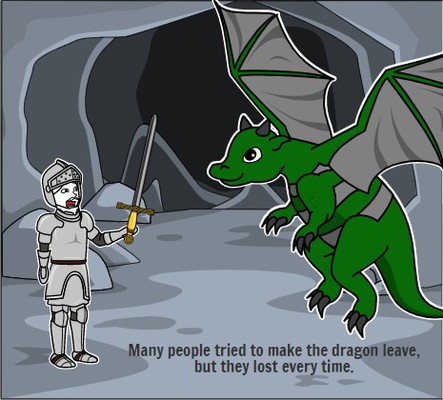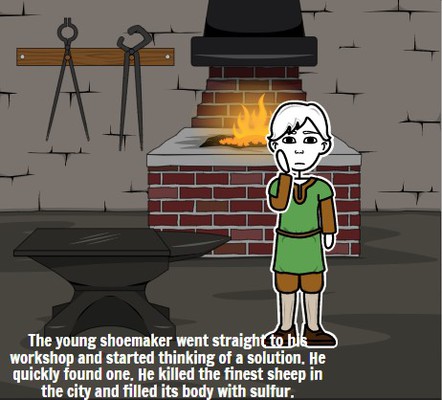The dragon of Cracow







The legend about Wars and Sawa


There is some Polish traditional legends.
The Dragon of Krakow ( Cracow )
Long ago in Poland’s early history, On the River Vistula, there was a small settlement of wooden huts inhabited by peaceful people who farmed the land and plied their trades. Near this village was Wawel Hill. In the side of Wawel Hill was a deep cave. The entrance was overgrown with tall, grass, bushes, and weeds. No man had ever ventured inside that cave, and some said that a fearsome dragon lived within it. The young people of the village didn’t believe in the dragon. The old people of the village said that they had heard their fathers tell of a dragon who slept in the cave, and no man must dare waken it, or there would be dire consequences for them all. Some of the youths decided to explore the cave and put an end to such foolish talk. They thought that they knew better and dragons were just old stories from the past. A group of these young people took some torches and went to the cave. They slowly entered the cave until they came to a dark mass of scales blocking their way and the sound of heavy breathing. The boys ran as the dragon awakened and roared. Fire came from it’s mouth warming the boys heels and backs. When they were far enough away, they looked back and saw the dragon at the entrance of the cave, very angry being awakened from it’s sleep. From that day on, the people knew no peace. Every day the dragon appeared and carried off a sheep or preferably young virgins. The populace made many attempts to kill the dragon but nothing succeeded and many of those that attempted were killed. The hero in this part of the story differs. In the village lived a wise man, or a shoemaker or a shoe makers apprentice named Krakus or Krac. He got some sheep and mixed a thick, yellow paste from sulfur. Krakus smeared it all over the animals. Then led them to a place where the dragon would see them. The dragon came out as expected, saw the sheep, roared, rushed down the hill and devoured the sheep. The dragon had a terrible fire within him, and a terrible thirst. It rushed to the River Vistula and started drinking. It drank and drank and could not stop. The dragon began to swell, but still it drank more and more. It went on drinking till suddenly there was a great explosion, and the dragon burst. There was great rejoicing by the people. Krakus, was made ruler of the village, and they built a stronghold on Wawel Hill. The country prospered under the rule of Krakus and a city grew up around the hill which was called Krakow, in honour of Krakus. When Krakus died, the people gave him a magnificent burial, and erected a mound over his tomb which can be seen to this day. The people brought earth with their own hands to the mound, and it has endured through all the centuries as a memorial to the person that killed the dragon of Krakow.
The large 200-foot-long cave in Wawel Hill, Krakow, which has been known for centuries as the monster’s den, now attracts thousands of visitors each year. Whatever the truth of the dragon legend, the Dragon’s Cave (Polish ‘Smocza Jama’) is Cracow’s oldest residence, inhabited by man from the Stone Age through the 16th century.
The Polish Woman who chose to drown herself rather that marry a German!
Her name was Wanda, and she was very beautiful and although she was but a young girl when she became Queen, she had wisdom and understanding far beyond her years. She loved her country very dearly and she ruled wisely and justly over the people who looked upon her with the greatest of love and respect.
With all her qualities, her beauty and her wisdom, many princes sought to marry her, but Wanda would accept none of them, for she had not yet found one who was pleasing to her and who would help her to rule wisely and well over her beloved country. Poland was dear to Wanda, above all else, and she spared no effort to make her people happy. She waged war against aggressors who tried to invade her country, herself leading her soldiers in the battlefield. Her presence inspired them to defeat many foes.
Wanda's fame spread far and wide, and even a German prince, named Rytigier, heard of her beauty, her valour and, what was even more attractive to him, he heard that the lands of Poland were fruitful and rich. He therefore sent messengers with a letter to Wanda. The messengers were received at Wanda's court with courtesy and hospitality, as was always the custom in Poland. It was noticed that they were rough, uncivilized men who seemed surprised at the luxury and comfort of Wanda's Court. After they had rested and changed their apparel, they were ushered into Wanda's presence. Although on the face of it they seemed respectful, they looked about them with an air of appraising the value of everything they saw before them, as though it would soon be theirs.
Wanda read the letter and turned deathly pale. The contents were clear enough; Rytigier asked her for her hand in marriage, stipulating that as her dowry she should bring him the lands of Poland, and threatening war in the event of a refusal . Now Rytigier had a very powerful army, famed all over Europe as the strongest and best equipped of any prince. Wanda's army, on the other hand, had lost heavily in recent wars. To accept Rytigier's proposal of marriage was unthinkable. Wanda could not, would not subject her country to a German rule. She looked at the messengers and shuddered. To wage war might be fatal with the armies so ill-matched. Defeat at the hands of the Germans would certainly bring the cruellest possible reprisals to the Poles. But, in a firm voice, Wanda made her answer. She refused to surrender herself and her country to the Germans. She had made her decision. Wanda would sacrifice her life for Poland.
She retired to her private quarters and there prayed to the gods that they would grant Poland freedom from the Germans in return for her sacrificing her life. Her prayer was granted, and Wanda threw herself into the river Vistula. When her body was recovered, she was buried with all honours, and a mound was raised to her memory beside that of her father, Krakus.